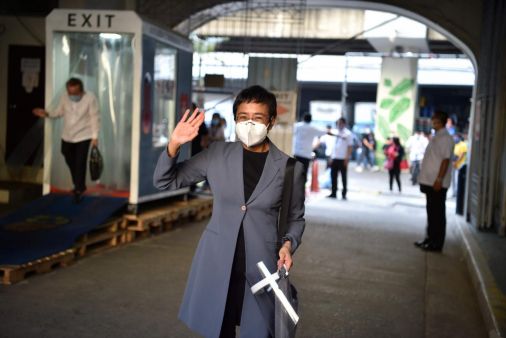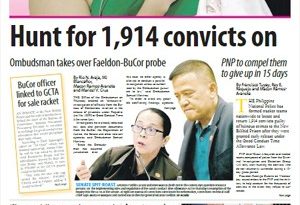COLUMNISTS: The Philippines – fighting for free speech in a pandemic
Appeals in the works despite tough new laws, recent actions against the news media
Covid-19 has upended many things in daily life – from travel to retail to education. More menacingly, it has also unleashed an authoritarian blitzkrieg from Hungary to Turkey to the Philippines, where populist leaders are taking advantage of state of emergency conditions and lockdowns that have made public protests and opposition mobilisation next to impossible.
This week’s conviction of Maria Ressa, President Rodrigo Duterte’s bete noire and founder of the Rappler news portal, on cyber libel charges, illuminates how this plays out in the broader landscape of rapid authoritarian consolidation made possible by the pandemic.


Mr Duterte, who has repeatedly threatened to impose nationwide martial law, has also long resented the liberal-leaning mainstream media. The reports by Rappler, ABS-CBN network and the Philippine Inquirer about his administration’s brutal drug war and other questionable policies have earned them the ire of the President.
Since coming to power, Mr Duterte has launched an unprecedented campaign of intimidation against the country’s freewheeling media. He has accused journalists of corruption and biased coverage and has warned that “just because you’re a journalist you are not exempted from assassination if you’re a son of a bitch”.
His threats against the media took a more menacing character in the light of the ongoing Covid-19 pandemic. The ABS-CBN shutdown came just over a month, and Ressa’s conviction two months, after the Philippine Congress seamlessly handed the President sweeping emergency powers, which authorised him to “move, decide and act freely for the best interest of the Filipino people during this health crisis”.
Since the imposition of a nationwide lockdown in late March, countless voices of dissent have faced unprecedented pressure. More than a dozen warrant-less arrests and subpoenas have been filed against netizens accused of engaging in “misinformation”.
Of particular concern is the impending adoption of a draconian anti-terrorism law, which could potentially be weaponised against political opposition and civil dissent.
Also hanging in the balance is the fate of the country’s oldest and largest media conglomerate, ABS-CBN, which was perfunctorily ordered in early May to go off the air. Its licence to broadcast its television and radio programmes was revoked even though the company’s franchise was still under deliberation by the Philippine Congress.
The Philippine Supreme Court is set to deliberate the network’s case next month, while civil society groups are expected to also challenge the new anti-terrorism law at the High Court. As for Ressa, who faces six years in jail for the cyber libel case alone, she is expected to appeal the verdict while also battling seven other charges, including tax evasion.
“I admit that it took me more than a month to defang the fear of jail. I hated that the baton was passed to me at this moment in time, but I also knew I wasn’t going to drop it,” Ressa, a Princeton alumna, told graduates at the university’s virtual commencement last month.
Presidential spokesman Harry Roque was quick to dissociate Mr Duterte from the Ressa case, which has gained widespread international attention. Mr Roque asserts that the “President has said repeatedly that he has never filed a case of libel against a journalist despite his negative reporting” and that the Filipino leader “believes in free speech, and believes that anyone who works in government should not be thin-skinned”. Earlier, the government made an almost exactly identical claim vis-a-vis ABS-CBN’s closure, maintaining that what’s at stake is standard application of law and Mr Duterte is “neutral” on the issue.
Ressa, the founder of the news portal, along with a former Rappler employee, Reynaldo Santos Jr, were both convicted on cyber libel charges on Monday in a case centred on allegations involving a local businessman.


Judge Rainelda Estacio-Montesa, who presided over the case, was adamant that what’s at stake is “accountability” and that there “is no curtailment of the right to freedom of speech and of the press”. The defendants, she said, failed to back up their allegations.
The case concerns a 2012 story written by Santos which alleged that a businessman, Mr Wilfredo Keng, had links to illegal drug and human trafficking. What has drawn criticism at home and abroad, however, is that the article was published by Rappler months before the Philippines’ new cyber libel laws came into effect in 2013. Prosecutors argue that the law could still be applied because a correction made in 2014 to fix a “typo” in the story was considered a “republication” of the article.




Mrs Amal Clooney, one of Ressa’s lawyers, condemned the conviction as “an affront to the rule of law, a stark warning to the press, and a blow to democracy in the Philippines”. No less than Philippine Vice-President Leni Robredo has criticised the verdict as part of a broader campaign of “silencing, harassing, and weaponising law against the media”.
The verdict against Ressa was the second major blow against the media. The first shock came when the National Telecommunications Commission (NTC) issued an immediate “cease and desist” against the liberal ABS-CBN network last month. Observers noted darkly then that it evoked memories of the martial law years under strongman Ferdinand Marcos, who effectively shut down the independent media in 1972.
Although Mr Duterte has repeatedly threatened the country’s leading liberal media outlets with potential closure, accusing them of legal violations from “swindling” to tax evasion to foreign ownership with scant evidence, the move against the ABS-CBN still came as a surprise. For a long time, many doubted if Mr Duterte would go so far as to shut the country’s largest broadcast network responsible for the most popular entertainment and news programmes in the country, or oversee the conviction of Ressa, the Philippines’ most celebrated journalist.


Concerns about selective targeting of media outlets and the existential threat to the Philippines’ long history of press freedom were heightened when in a candid moment, Mr Duterte’s most trusted aide, Senator Bong Go, confessed that what’s really at stake are “the grievances of the President against the network”. “If you are mean to the President, he will be meaner to you,” he warned critics. “If you are nice to the President, then he will be nicer to you.”




To be sure, the Philippines has long been a dangerous place for journalists, who have been harassed and killed by militants, crooks and political warlords. During Mr Duterte’s first three years in office, those in the news business continued to live dangerously, with as many as 154 incidents of harassment and attacks, 15 of them fatal, recorded across the country. “Of the 154 cases, at least 69 had linked state agents – public officials from the executive and legislative branches, uniformed personnel, and Cabinet appointees of President Duterte – as known or alleged perpetrators. Of these 69 state agents, about half or 27 are from national government agencies,” a media watchdog, The Freedom for Media, Freedom for All Network, reported last year.
In the global Press Freedom Index, the Philippines, formally a liberal democracy, ranks below several repressive Arab regimes and, in Asia, just above Myanmar and Thailand, which are under de facto military rule.
Even more worrying, the recent passage of a draconian anti-terror law, which could lead to charges of terrorism against anyone accused of seeking to “intimidate the general public” or “create an atmosphere to spread a message of fear” has had civil rights groups warning that it would give the government “almost free rein in determining who are suspected terrorists” with potentially devastating impact on the opposition and press freedom.




Mr Duterte’s endgame is far from clear, but there are fears that he may follow in the footsteps of other authoritarian populists, from Hungary’s Prime Minister Viktor Orban to Turkey’s President Recep Tayyip Erdogan, who systematically eroded free speech protections once in power.
But the fight is far from over. From challenging the anti-terrorism law and ABS-CBN’s closure in the Supreme Court, to appealing against Ressa’s conviction, the opposition and independent media are determined to hold the line in hopes of better days. After all, they survived the darkest days of the Marcos dictatorship.
And time is fortunately on their side, With Mr Duterte limited to one term and entering his fifth year next June, he effectively becomes a lame duck by the middle of next year. Also, progressive relaxation of the ongoing lockdown will create more space for protest and mobilisation; those who resist him may still have a fighting chance.


• Richard Javad Heydarian is a columnist at the Philippine Daily Inquirer and previously worked as ABS-CBN’s resident political analyst in 2016 until early 2017.











